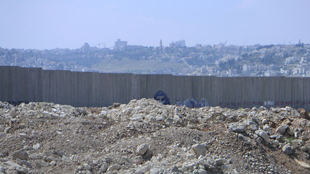 A barrier wall in the West BankWIKIMEDIA, SOMANNew European Commission guidelines issued on July 19 stipulate that as of 2014, EU research funds will not support projects in areas that were not under Israel’s control before 1967, including the occupied West Bank, East Jerusalem, the Gaza Strip, and the Golan Heights. In response, Israel is considering dropping out of Horizon 2020, a lucrative European Union research program that had been expected to bolster Israel’s research coffers by about €300 million ($401 million). Negotiations on the wording of the guidelines will continue in Brussels in September.
A barrier wall in the West BankWIKIMEDIA, SOMANNew European Commission guidelines issued on July 19 stipulate that as of 2014, EU research funds will not support projects in areas that were not under Israel’s control before 1967, including the occupied West Bank, East Jerusalem, the Gaza Strip, and the Golan Heights. In response, Israel is considering dropping out of Horizon 2020, a lucrative European Union research program that had been expected to bolster Israel’s research coffers by about €300 million ($401 million). Negotiations on the wording of the guidelines will continue in Brussels in September.
European Commission spokesperson Michael Jennings told ScienceInsider that the European Union’s ban on funding projects in the occupied territories amounts to a clarification of a preexisting policy, and that the impact will be minimal, because little research is done there. However, the guidelines are being considered by Israeli officials to be an affront to their national sovereignty. “We will not accept any outside diktat about our borders,” Prime Minister Benjamin Netanyahu said in a statement last month.
Israel, home to a fast-growing biotech industry, has participated in EU research programs since 1996 as an “associated country”—a status that allows countries outside of the European Union to compete for research grants in exchange for a fixed cut of the country’s gross domestic project. During the most ...




















